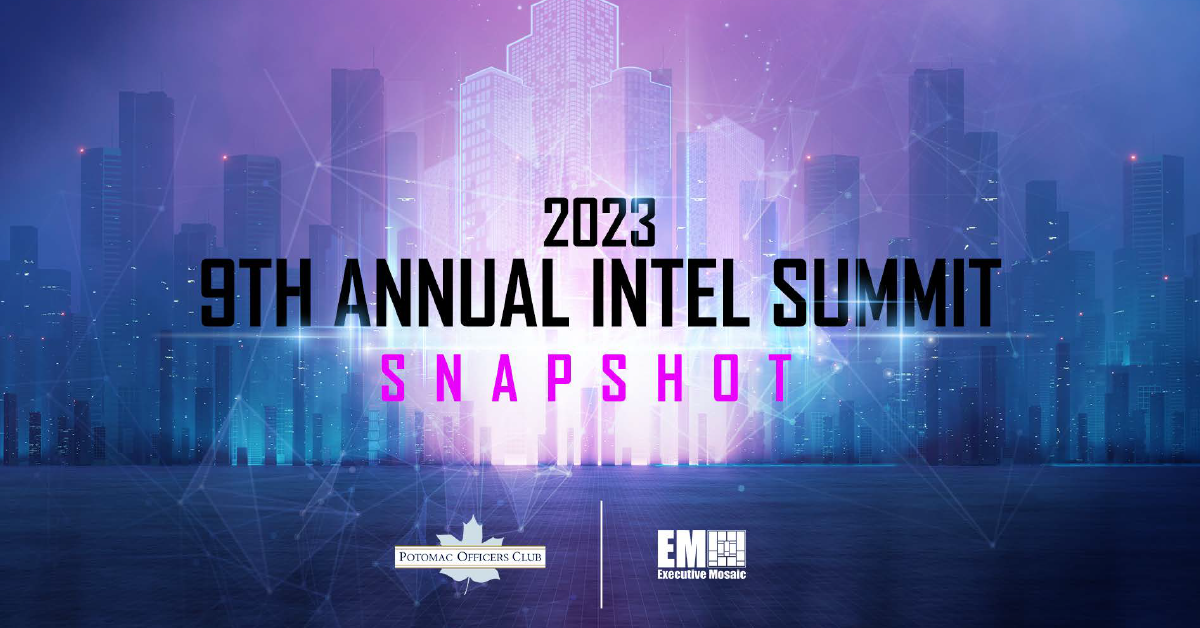Intelligence Community leaders have recognized the need to evolve to compete in the constantly changing intelligence landscape. To accomplish its transformation goals, the IC has embarked on an all-encompassing modernization journey that considers not just technology, but its people and priorities.

At the Potomac Officers Club’s 9th Annual Intel Summit on Sept. 21, you have the opportunity to hear from top IC officials, including keynote speakers Principal Deputy Director of National Intelligence Dr. Stacey Dixon, National Geospatial-Intelligence Agency Director Vice Admiral Frank Whitworth III, Defense Intelligence Agency Deputy Director Suzanne White and Central Intelligence Agency Deputy Director of Digital Innovation Jennifer Ewbank. These leaders will be joined by elite industry executives to consider the challenges and opportunities the IC faces as it drives its mission forward.
Don’t miss your chance to hear from these leaders in person! Register to attend the summit here.
These speakers have already spoken extensively about IC strategies for modernization. Below are several insightful comments from each leader.
Dr. Stacey Dixon
Dixon, a four-time Wash100 Award winner, helped pen the IC Data Strategy for 2023-2025, and said in a note that it “drives deliberate planning to accelerate the delivery of relevant data to those that need it, when they need it, both now and in the future.” She also stressed the need to keep an “eye on how data and technology influence our long-term needs.”
Last year, Dixon spoke at GovCon Wire’s 2nd Annual IC Acquisition and Technology Innovation Summit, where she discussed the community’s implementation of automation in the acquisition process.
“We at ODNI, in coordination with organizations across the entire IC, are not just acknowledging that we must do better when it comes to acquisition,” she said. “We’re taking steps to improve the process that is notorious for its inefficiency.”
VADM Frank Whitworth III
Whitworth has spoken extensively about the intersection of developments in the space domain, data and geospatial intelligence. During the United States Geospatial Intelligence Foundation’s GEOINT Symposiums in May, he said the volume of GEOINT data is expanding “with the proliferation of collection systems and expansion into the space domain.”
The two-time Wash100 Award recipient shared that one way NGA is working to harness the widening expanse of data is through the developing Joint Regional Edge Node.
“JREN will increase resiliency and reduce transport latency and it will facilitate the rapid movement of critical intelligence and data sharing,” he said at the Department of Defense Intelligence Information System Worldwide Conference in December 2022.
Suzanne White
White has previously offered her insights on DIA activities at Executive Mosaic events. During a keynote address at GovCon Wire’s IC Acquisition and Innovation Forum in February 2021, she emphasized the importance of partnerships in DIA innovation, which persists as a key focus for the agency today. She also noted the intensifying race between the United States and its adversaries to develop cutting-edge capabilities.
“There is urgency for DIA, as well as the greater Intelligence Community, to act and create solutions better suited for this greater and more dangerous competitive environment,” she said.
Jennifer Ewbank
In a piece published to LinkedIn in January, Ewbank, a two-time Wash100 awardee, noted innovation, partnerships and urgency as three major themes that have shaped the current trajectory of CIA technology development. The complex innovation challenge, she wrote, is not just about capability development, but “solving real problems today and developing solutions to provide concrete intelligence advantages over the long term.”
A major focus area for technology innovation is data, and according to Ewbank, the continuous influx of mass amounts of data “poses a huge challenge” for the IC.
“Those in the intelligence community must master the collection, movement, storage, and exploitation of data so that we can enable operations, enhance analytic insights, and provide policymakers with the strategic advantage they need to protect America and her allies,” she wrote in a LinkedIn post.




